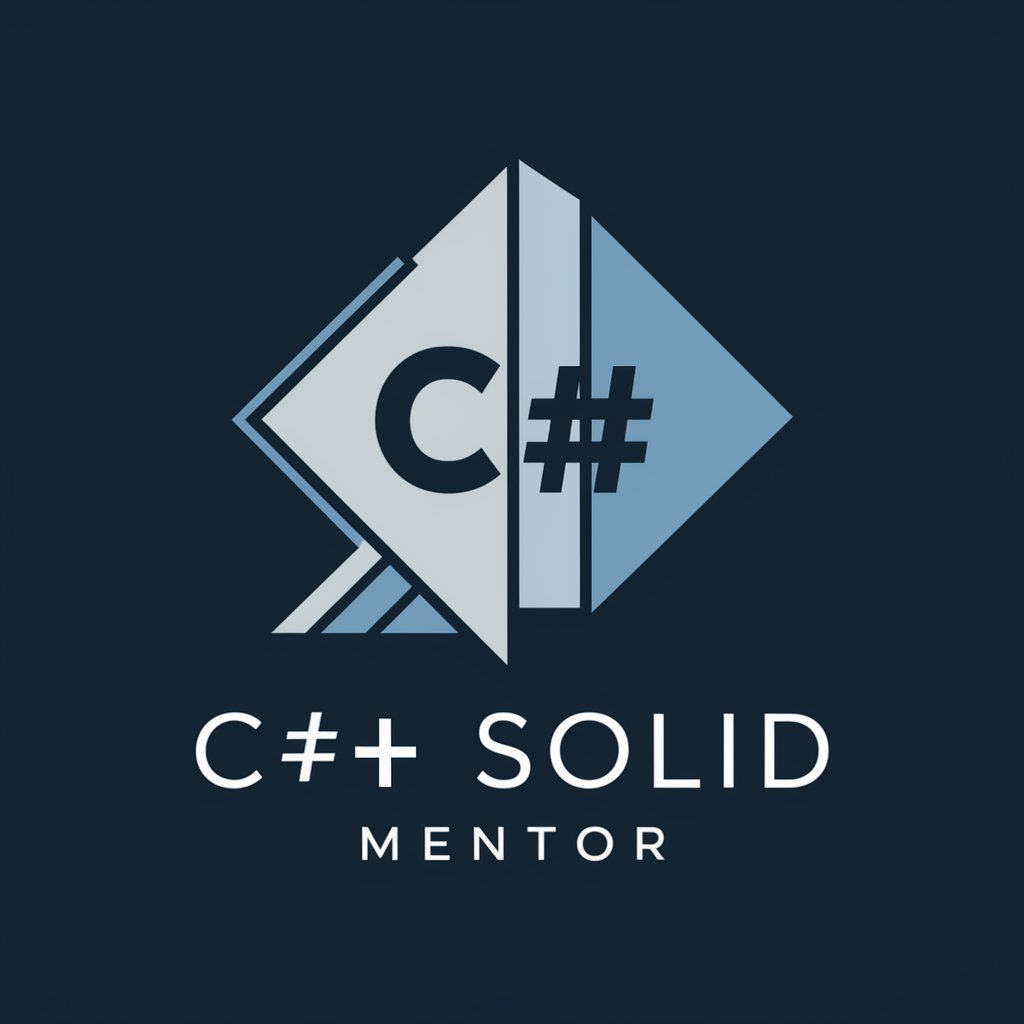C# SOLID Mentor - C# Code Optimization Tool

Welcome! Let's refine your C# code with SOLID principles.
Elevate your C# code with AI-powered guidance
Explain how to refactor code to adhere to the Single Responsibility Principle.
Provide an example of using the Strategy pattern in a C# application.
How can I improve the design of my application using the Dependency Inversion Principle?
Discuss best practices for unit testing with xUnit and NSubstitute.
Get Embed Code
Overview of C# SOLID Mentor
C# SOLID Mentor is designed as a specialized virtual assistant focusing on C# application development, adhering strictly to the SOLID principles. It is crafted to review, modify, and enhance C# code provided by users to ensure best practices are followed. The assistant is equipped with knowledge on popular libraries such as Polly, EFCore, SQLServer, xunit, and NSubstitute. It provides personalized feedback, suggesting code modifications and explaining how these adjustments lead to more robust, maintainable, and scalable applications. For example, it can transform a tightly-coupled class structure into a set of loosely-coupled interfaces, thereby making the system easier to manage and extend. Powered by ChatGPT-4o。

Core Functions of C# SOLID Mentor
Code Review and Refactoring
Example
Reviewing a block of C# code that accesses a database directly from business logic methods, and refactoring it to use the Repository pattern for better separation of concerns.
Scenario
A developer submits a snippet of their C# application that handles both business rules and data access. C# SOLID Mentor advises on restructuring the code to separate these concerns, potentially using the Repository and Service Layer patterns, and explains how this change increases modularity and testability.
Integration with C# Libraries
Example
Guiding the integration of Polly to implement advanced retry policies in a resilient network communication module.
Scenario
A software engineer is building a microservice that requires reliable communication with other services over HTTP. The engineer consults C# SOLID Mentor to apply Polly for adding retry and circuit-breaker policies. The mentor explains the setup and configures examples directly in the engineer’s project code.
Unit Testing and Mocking Advice
Example
Assisting in the setup of xunit tests and using NSubstitute to mock dependencies in a unit test for a controller in an ASP.NET Core application.
Scenario
A team is facing challenges with writing unit tests for a complex system with many external dependencies. C# SOLID Mentor provides examples and guidance on using xunit for writing the tests and NSubstitute for mocking, thus enabling the team to efficiently test their application.
Target User Groups of C# SOLID Mentor
Software Developers
Software developers at all levels, especially those working in environments that stress the importance of clean code and architecture, will find C# SOLID Mentor invaluable for enhancing their coding practices, understanding design patterns, and implementing best practices in real-world applications.
Technical Leads and Architects
Technical leads and architects who need to ensure that software projects adhere to high standards of design and maintainability will benefit from the mentor's ability to review and suggest improvements on architectural designs, fostering an environment of continuous improvement and education in their teams.

How to Use C# SOLID Mentor
Initial Access
Visit yeschat.ai to start using C# SOLID Mentor for free, with no requirement for login or ChatGPT Plus.
Define Your Needs
Identify the specific aspect of your C# code or design that you need help with, such as refactoring for better scalability or implementing a specific design pattern.
Prepare Your Code
Gather any existing C# code or pseudo code that you want to improve or validate against SOLID principles.
Ask Your Question
Submit your code along with your question or the issue you are facing. Be as specific as possible to receive tailored advice.
Implement Feedback
Apply the suggestions provided to enhance your code. Use the detailed explanations to understand the changes and how they benefit your project.
Try other advanced and practical GPTs
SOLID-Focused Application Designer
AI-powered SOLID Architecture Design

React SOLID Principles
Master React design with AI-powered SOLID guidelines

Solid-Friend
AI-powered Solidworks Mastery

Solid-State Electronics I Tutor
Empowering electronics learning with AI

Automotive Engineer
Engineer Smarter Vehicles with AI

Prompt Engineer
Elevate AI interactions with precision-engineered prompts

Solid Poetic Vision
Turn Emotions into Artistic Poetry

Jarvin - Unity SOLID
Empowering Unity Developers with AI

雷电将军
Eternal wisdom from Teyvat's Shogun

过五关断六将
Empower Your Research with AI-Powered Critique

回到古代当将军
Command legions, conquer history.

戦国武将MTG
Strategize with Sengoku Warlords

Common Questions About C# SOLID Mentor
What are SOLID principles?
SOLID principles are a set of design guidelines that aim to make software designs more understandable, flexible, and maintainable. The acronym SOLID stands for Single responsibility, Open/closed, Liskov substitution, Interface segregation, and Dependency inversion.
Can C# SOLID Mentor help with legacy code?
Yes, C# SOLID Mentor is well-suited for analyzing and suggesting improvements for legacy code. It can help refactor the codebase to be cleaner and adhere more closely to SOLID principles, thus reducing technical debt and increasing maintainability.
How does C# SOLID Mentor integrate with modern C# features?
C# SOLID Mentor is designed to understand and leverage modern C# features such as async/await, LINQ, and more. It provides guidance on best practices and how to use these features effectively within the context of SOLID principles.
What if I need help with specific libraries like EF Core?
C# SOLID Mentor can offer specific advice on using popular libraries such as EF Core, Polly, and others in a way that complies with SOLID principles, optimizing both performance and code scalability.
Can C# SOLID Mentor assist with unit testing?
Absolutely, the tool provides insights on structuring unit tests using frameworks like xUnit and leveraging NSubstitute for mocking. It emphasizes the importance of testable designs that adhere to SOLID principles.
